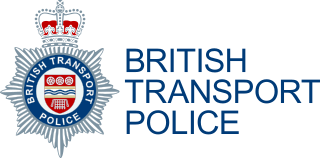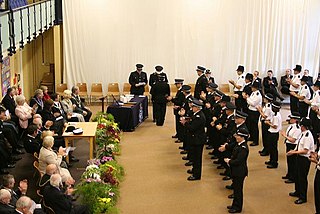A constable is a person holding a particular office, most commonly in criminal law enforcement. The office of constable can vary significantly in different jurisdictions. A constable is commonly the rank of an officer within the police. Other people may be granted powers of a constable without holding this title.

The British Transport Police is a national special police force that polices railways and light-rail systems in England, Wales and Scotland, for which it has entered into an agreement to provide such services. The force is funded primarily by the rail industry, and does not receive central government funding. British Transport Police officers do not have jurisdiction in Northern Ireland unless working under mutual aid arrangements for the Police Service of Northern Ireland, in which case any duties performed on a railway will be merely incidental to working as a constable in Northern Ireland.

Law enforcement in the United Kingdom is organised separately in each of the legal systems of the United Kingdom: England and Wales, Northern Ireland and Scotland. Most law enforcement is carried out by police officers serving in regional police services within one of those jurisdictions. These regional services are complemented by UK-wide agencies, such as the National Crime Agency and the national specialist units of certain territorial police forces, such as the Specialist Operations directorate of the Metropolitan Police.

The New South Wales Police Force is the primary law enforcement agency of the state of New South Wales, Australia. Divided into Police Area Commands (PACs), for metropolitan areas and Police Districts (PDs), for regional and country areas, the NSW Police Force consists of more than 400 Police stations and over 18,000 officers, who are responsible for covering an area of 801,600 square kilometres and a population of more than 8.2 million people.
Chief constable is the rank used by the chief police officer of every territorial police force in the United Kingdom except for the City of London Police and the Metropolitan Police, as well as the chief officers of the three 'special' national police forces, the British Transport Police, Ministry of Defence Police, and Civil Nuclear Constabulary. The title is also held by the chief officers of the principal Crown Dependency police forces, the Isle of Man Constabulary, States of Guernsey Police Service, and States of Jersey Police. The title was also held, ex officio, by the president of the Association of Chief Police Officers under the Police Reform Act 2002. It was also the title of the chief officer of the Royal Parks Constabulary until this agency was disbanded in 2004.
Most of the police forces of the United Kingdom use a standardised set of ranks, with a slight variation in the most senior ranks for the Metropolitan Police and City of London Police. Most of the British police ranks that exist today were chosen by Home Secretary Sir Robert Peel, the founder of the Metropolitan Police, enacted under the Metropolitan Police Act 1829. The ranks at that time were deliberately chosen so that they did not correspond with military ranking, because of fears of a paramilitary force.

The Special Constabulary is the part-time volunteer section of statutory police forces in the United Kingdom and some Crown dependencies. Its officers are known as special constables.

The Queensland Police Service (QPS) is the principal law enforcement agency responsible for policing the Australian state of Queensland. In 1990, the Queensland Police Force was officially renamed the Queensland Police Service and the old motto of 'Firmness with Courtesy' was changed to 'With Honour We Serve'. The headquarters of the Queensland Police Service is located at 200 Roma Street, Brisbane.

The South Australia Police (SAPOL) is the police force of the Australian state of South Australia. It is an agency of the Government of South Australia within the South Australian Department of Justice. SAPOL is directed by the Commissioner of Police, who reports to the Minister for Police. As of 30 June 2017, South Australia Police had 4948 active sworn members, including 339 cadets in training and 132 protective services officers, as well as approximately 920 civilian staff operating across 28 metropolitan and 110 regional police stations.

Hendon Police College is the principal training centre for London's Metropolitan Police Service. Founded with the official name of the Metropolitan Police College, the college has officially been known as the Peel Centre since 1974, although its original name is still used frequently. Within the police service it is known simply as "Hendon".

The Police Federation of England and Wales (PFEW) is the statutory staff association for police constables, sergeants, inspectors and chief inspectors in the 43 territorial police forces in England and Wales. Under UK labour law, the police are prohibited from joining ordinary trade unions to defend pay and working conditions, by the Police Act 1996, because of the view that a police strike would pose an exceptional public safety risk. The PFEW was originally established by the Police Act 1919 as an alternative system, which would serve to represent staff, and where disputes could be resolved through arbitration so long as the government continued to bargain in good faith.

The police strikes of 1918 and 1919 in the United Kingdom resulted in the British government putting before Parliament its proposals for a Police Act, which established the Police Federation of England and Wales as the representative body for the police. The Act barred police from belonging to a trade union or affiliating with any other trade union body. This Act, drafted and passed into law, was passed in response to the formation of the National Union of Police and Prison Officers (NUPPO). A successful police strike in 1918 and another strike in June 1919 led to the suppression of the union by the government. On 1 August 1919, the Police Act 1919 passed into law. Only token opposition from a minority of Labour Members of Parliament was voiced in Parliament.

Lancashire Constabulary is the territorial police force responsible for policing the ceremonial county of Lancashire in North West England. The force's headquarters are at Hutton, near the city of Preston. As of September 2020, the force has 3,088 police officers, 190 special constables, and 280 police community support officers (PCSO), 300 police support volunteers (PSV), and 2,287 staff.

Hampshire Constabulary is the territorial police force responsible for policing the counties of Hampshire and the Isle of Wight in South East England, United Kingdom.

The Isle of Man Constabulary is the national police service of the Isle of Man, an island of 80,000 inhabitants, situated approximately equidistant from Northern Ireland, Wales, Scotland and England.
Police ranks are a system of hierarchical relationships in police organizations. The rank system defines authority and responsibility in a police organization, and affects the culture within the police force. Police ranks, dependent on country, are similar to military ranks in function and design due to policing in many countries developing from military organizations and operations, such as in western Europe, former Soviet countries, and English-speaking countries. Usually, uniforms denote the bearer's rank by particular insignia affixed to the uniforms.

The Bangladesh Police of the People's Republic of Bangladesh is a law enforcement agency, operating under the Ministry of Home Affairs. It plays a crucial role in maintaining peace, and enforcement of law and order within Bangladesh. Though the police are primarily concerned with the maintenance of law and order and security of persons and property of individuals, they also play a big role in the criminal justice system. Bangladesh police played an important role during the Bangladesh's liberation war.
The Police Federation for Northern Ireland (PFNI) is the representative body to which all members of the Police Service of Northern Ireland belong up to and including the rank of Chief Inspector, as well as the ranks of reserve and part-time officers. The federation was established on 15 July 1971 as a result of the Police Act (NI) 1970. There are 6800 members as of June 2016 according to their website and the current chairman is Mark Lindsay.
A special constable or special police constable is generally an auxiliary or part-time law enforcement officer.
The 1931 New Year Honours were appointments by King George V to various orders and honours to reward and highlight good works by citizens of the United Kingdom and British Empire. They were announced on 30 December 1930.












